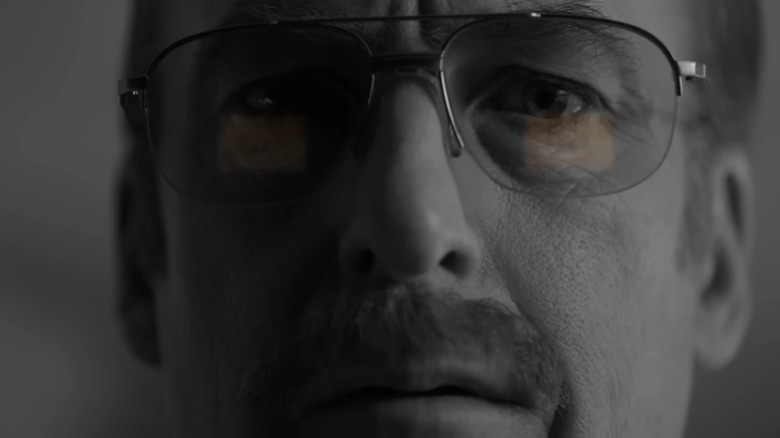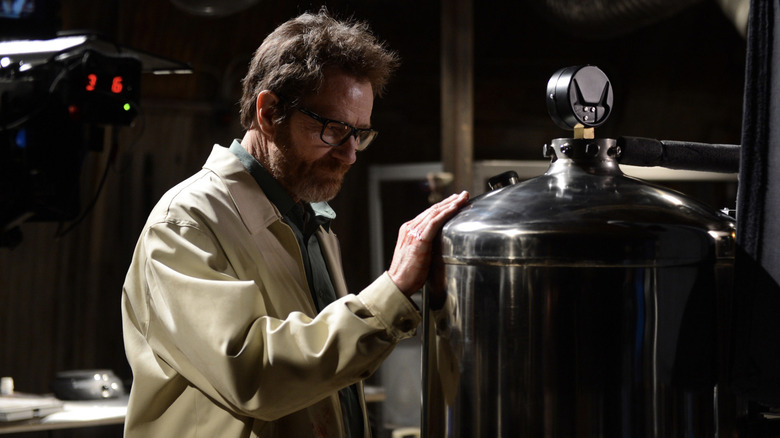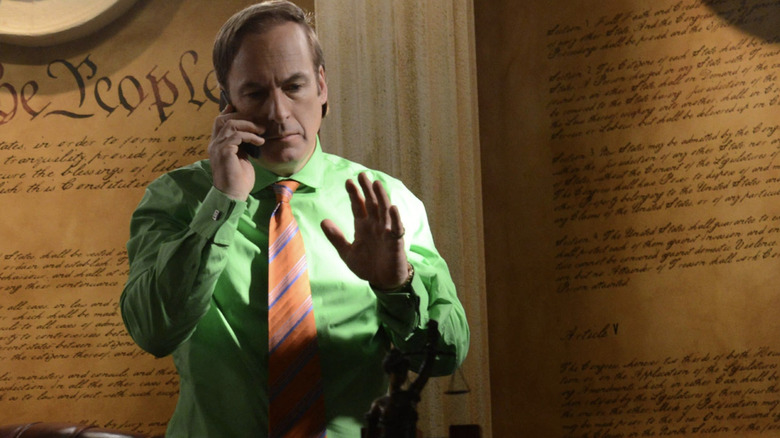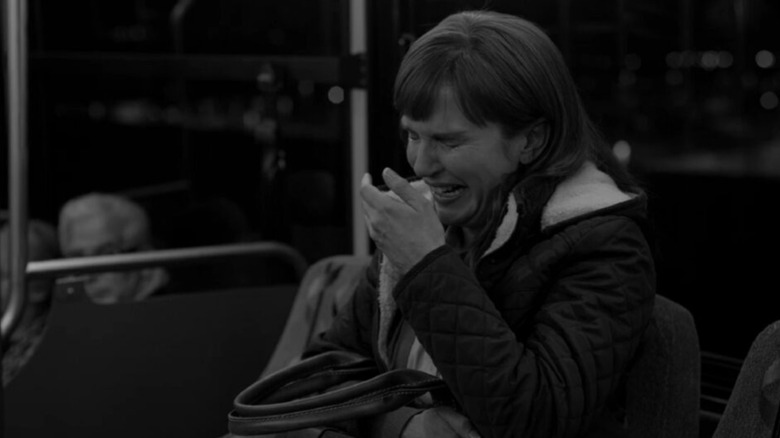Why Better Call Saul Marks The End Of The Breaking Bad Universe For Vince Gilligan
Vince Gilligan has been deeply embedded in the shady underworld of Albuquerque since the original "Breaking Bad" pilot aired in 2008. Since then, the writer/director has gone on to make a prequel/sequel series in "Better Call Saul" and the sequel film titled "El Camino: A Breaking Bad Movie." Each project is arguably just as good as the other, which is a testament to the world that Gilligan played a significant role in creating. The "Breaking Bad" universe spans decades back to the 1970s. Interestingly enough, while we know the earliest starting point for all the most significant story points in this world, we're not entirely sure when it ends.
For Vince Gilligan, that apparent ending may be in sight, as "Better Call Saul" is looking to end the tragedy of Jimmy McGill when its final episode airs on August 15 on AMC. The black and white flash-forwards give audiences the most recent developments in the world of "Breaking Bad" and "Better Call Saul." Moreover, with nearly every major player in both shows receiving some form of a definitive ending, all that's left is for criminal lawyer Saul Goodman to get his not-so-happy ending. That being said, it seems that Vince Gilligan's tenure in the "Breaking Bad' universe of movies and shows is at an end.
Leave a good thing alone
Vince Gilligan's final writing and directing credit in the "Breaking Bad" universe came from the penultimate episode in the final season of "Better Call Saul." Titled "Waterworks," the episode plays out like a more low-key version of "Ozymandias," one of the last episodes in the final season of "Breaking Bad." The striking imagery, melancholy tone, and overall dreariness accentuated by the primarily black and white cinematography help to make the episode some of Gilligan's best work as a writer and director on the show.
When speaking to Rolling Stone about "Waterworks" and its place at the end of the "Breaking Bad" timeline, Gilligan answered whether or not he would revisit the world:
"I can definitely imagine revisiting it. Selfishly, I'd like to do so, to keep this thing going. But without naming any names, I look around at some of the worlds, the universes, the stories that I love, whether they're on TV or in the movies. And I think there's a certain point, and it's hard to define, where you've done too much in the same universe. Just leave it alone."
Gilligan seems to grasp the phrase "if you love something, let it go." As a creator of such an iconic series, there's always the temptation for easy money by using the iconic status of a show like "Breaking Bad" and milk it for everything it's worth. However, Gilligan clearly has respect for himself and the world he helped create.
A smaller universe
Gilligan elaborated on the idea of comparing his world of "Breaking Bad" to other universes that are still ongoing, speaking of the scale of the very real city of Albuquerque, New Mexico:
"And some universes are much bigger and more elastic. Ours is a very small one, Albuquerque, New Mexico, versus some of these worlds and series of movies and TV shows. The main thing I'm scared of is becoming too much of a one-trick pony. Yes, I could do more with this universe. And maybe someday I will, especially if I fail at everything that comes next. Then I'll come crawling back. But right now, whether there's more room to grow or not — and there probably is — I feel like it's time to do something new."
The fact that Gilligan is coming from a very practical standpoint about all of this is somewhat amusing. The talented writer has set a precedent for television shows along with his team of writers on both "Breaking Bad" and "Better Call Saul," bringing a new level of detail to the story and characters that's rarely seen. The creator's brutal honesty about returning to it if he fails is something to be admired. Until then, though, Vince Gilligan is ready to try something new.
Waterworks
When asked in the same interview about how he feels about everything finally concluding the world of "Breaking Bad" and "Better Call Saul" (at this point, basically no rock in Albuquerque's desert has been left unturned), Gilligan gave a bit of an anti-climactic yet poignant answer:
"It's funny. A lot of people have been asking me lately, and it hasn't really hit me. The end of Breaking Bad was very much a bright line, a clear delineation. I remember being on the set on the last day, and everybody was very emotional. That was a great many years ago. It's been 15 years now, and that was only year six or something like that, and that felt more momentous, more monumental. It's perhaps not a satisfying answer."
Gilligan, being the writer that he is, connected his time being at an end in this fictional universe with a scene from the latest episode of "Better Call Saul," which had Kim Wexler (Rhea Seehorn) suddenly experience an outpouring of emotions:
Perhaps it hasn't hit me yet. I think it's hit Peter, I think it's hit the writers and the actors. Maybe it'll be a delayed reaction. I hope it won't be quite as intense and quite as public as what Kim goes through on that rental-car shuttle. But maybe it's like the reaction she has, after six years, crying for Howard Hamlin and whatever else she's crying for — her lost soul. I hope I'm home alone if that happens.
Vince Gilligan is a highly talented writer, and while his time in this incredibly well-written "Breaking Bad" universe may be at an end, it will be exciting to see what he works on next.



